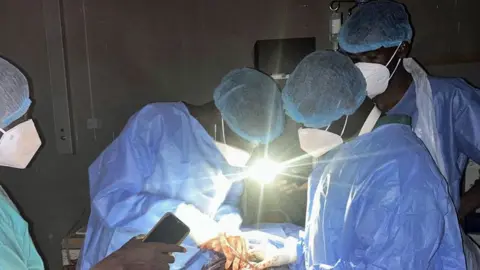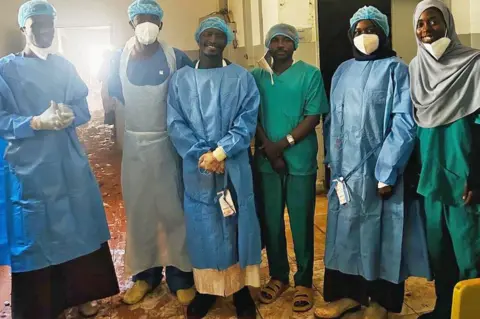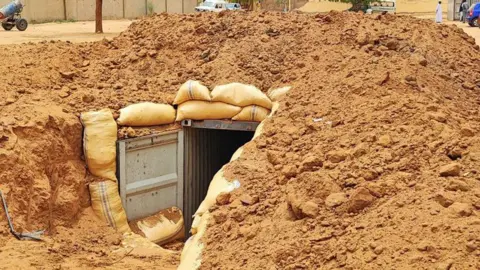
 Muddathir Ibrahim Suleiman
Muddathir Ibrahim SuleimanDr. Mustafa Ali Abdel Rahman Ibo and his colleagues bravely perform surgery under increasing bombardment in the last remaining hospital in El Fasher, a city that has been under siege for the past nine months in the Darfur region of western Sudan.
During the past month, the hospital recorded 28 deaths and more than 50 injuries among staff and patients due to intense bombing. This is the largest number of casualties recorded in a month since the start of the siege.
Dr. Ibo, who is from Darfur and has lived in El Fasher since 2011, told the BBC: “The recent ongoing attacks targeting the Saudi hospital have intensified significantly and have become part of our daily lives.”
He said the most frightening day was when a team of paramedics was performing an emergency caesarean section as the bombing began, a near-death experience for all of them.
He said: “The first shell fell on the wall surrounding the hospital… (Then) another shell hit the maternity operating room, and the debris damaged the electric generator, and the electricity went out, plunging us into complete darkness.”
The surgical team had no choice but to use the torches on their phones to complete the two-hour operation.
Part of the building collapsed, the room was filled with dust, and fragments were scattered everywhere.
Dr. Khattab Mohammed, who was leading the surgery, described the risks.
The 29-year-old doctor told the BBC: “The situation was terrible, and the environment was no longer barren.”
He added: “After ensuring that we and the patient were safe from the shrapnel, we cleaned her and changed our surgical clothes because our clothes were filled with dust, and we completed the surgical operation,” noting that the patient could have died due to complications.
After the baby was successfully delivered, doctors moved the mother and newborn to another room to recover and then gathered for a group photo.
This was testimony to their survival, but Dr. Mohammed added: “I thought it might be the last photo we took, thinking that another shell would hit the same place and we would all die.”
They continued to perform two other emergency life-saving operations that day.
 Muddathir Ibrahim Suleiman
Muddathir Ibrahim SuleimanThese doctors – most of whom are graduates of El Fasher University – have remained in place since the outbreak of civil war in Sudan in April 2023.
The conflict has pitted the army against the paramilitary Rapid Support Forces and caused the world's largest humanitarian crisis, forcing more than 12 million people from their homes.
The two rivals were allies, coming to power together in a coup, but fell out over an internationally backed plan to move toward civilian rule.
A year into the conflict, the siege of El Fasher began. It is the only city still under army control in Darfur, where the Rapid Support Forces have been accused of carrying out ethnic cleansing against non-Arab communities.
The Rapid Support Forces began attacking El Fasher from three sides and cut off supply routes. In a report released last month, the UN Human Rights Office said the fighting left more than 780 civilians dead and more than 1,140 wounded – many of them victims of gunfire.
The fighting led to the closure of all other hospitals in El Fasher.
The South Hospital, supported by the medical charity Doctors Without Borders, was the main health facility in the city dealing with war casualties.
It was close to the front line, and RSF fighters stormed it in June, also looting medicine and equipment and assaulting staff.
The Saudi Hospital, run by the Ministry of Health and funded by NGOs, the United Nations and Doctors Without Borders, specializes in obstetrics and gynecology but now provides all medical services – and is the only place in North Darfur state with surgical capacity.
Mudathir Ibrahim Suleiman, the hospital's 28-year-old medical director, told the BBC that amid a shortage of medical supplies, equipment and workers, the Saudi hospital is facing “a heartbreaking situation that violates all humanitarian and international laws and values.”
He noted how terrifying the recent bombings were: “Pregnant women, children and staff were shocked and paralyzed, and some people were injured and had to be pulled out from under the rubble.
He added: “All the current circumstances force us to think about stopping our work, but women and children have no other place to save their lives than this hospital.”
“Staff at the hospital are doing their best to save lives.”
All aspects of normal life have completely disappeared from El Fasher, especially in the northern and eastern parts. The university is working, for example, through online learning, with examination centers set up in safer cities such as Kassala in eastern Sudan.
As hunger and insecurity spread, the city also became empty. About half the population has taken refuge in the nearby Zamzam camp. An estimated 500,000 people are now living in famine conditions.
The camp is also served by the Saudi Hospital, where MSF operates ambulances to bring emergency cases.
But these areas have also begun to come under attack recently, including an incident earlier this month when a gunman opened fire on “a clearly marked ambulance bearing the MSF logo and flag.”
“We are horrified by this deadly attack on humanitarian staff carrying out life-saving medical work where it is urgently needed,” Michel Olivier Lacharité of Doctors Without Borders said in a statement.
 Muddathir Ibrahim Suleiman
Muddathir Ibrahim SuleimanDr. Ebo admitted that it was his colleagues – there are 35 doctors and 60 nurses at the Saudi Hospital – who helped him keep going.
“We are losing people every day, offices and rooms are being destroyed, but thanks to the determination of the young staff, we continue to persevere.
“We derive our steadfastness from the people of El Fasher, as we are its children and graduates of El Fasher University.”
Aid agencies are warning that one of the worst maternal and child health emergencies is unfolding in Darfur, where some areas are also being targeted in air strikes by the military.
The World Health Organization called for an end to attacks on health facilities and adherence to international humanitarian laws.
“The sanctity of health must be respected even in war,” Loza Mesfin Tesfaye, communications officer at the World Health Organization in Sudan, told the BBC.
Dr. Mohamed, who is originally from Sudan's White Nile State but came to El Fasher to study medicine in 2014, also praises his team, which ignored several opportunities to escape.
“Our souls refused to abandon the people of this city, especially in light of the catastrophic conditions we witness daily.”
The paramedics, who communicated via WhatsApp chats and voice notes, all seemed focused.
“We are determined to continue saving lives, from wherever we can, even underground or under the shade of a tree, and we pray to God that the war will end and that peace will prevail,” Dr. Ibo said.
Sudanese journalist Mohamed Zakaria participated in the coverage
You may also be interested in:
 Getty Images/BBC
Getty Images/BBC








